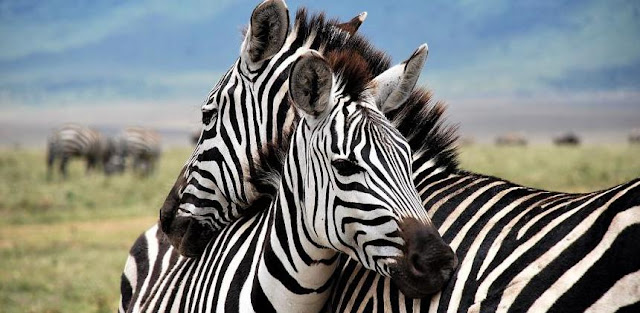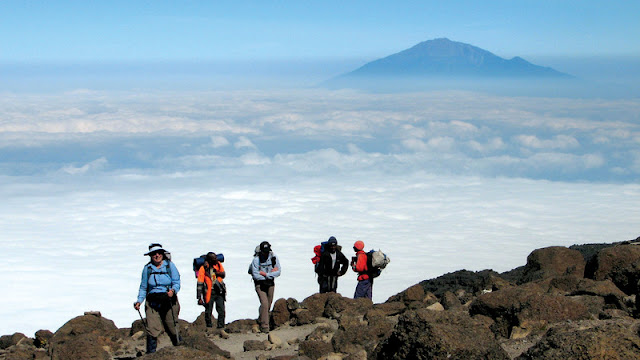KILIMANJARO CLIMB UMBWE ROUTE
UMBWE ROUTE 6 DAYS
The Umbwe route is a short, steep and direct route. It is considered to be very difficult and is the most challenging way up Mount Kilimanjaro. Due to the quick ascent, Umbwe does not provide the necessary stages for altitude acclimatisation. Although the traffic on this route is very low, the chances of success are also low. The route is offered at a minimum of six days, though seven days is recommended when attempting this route.
The Umbwe route should only be attempted by those who are very strong hikers and are confident in their ability to acclimatize. However, overall, the Umbwe route is not recommended and we discourage its usage for our clients.
Mount KilimanjaroElevation 5895mLocation Tanzania, AfricaNumber of Climbers 25,000 Annually - Day 1 Moshi (915 m/3,000 ft)Arrive at the Kilimanjaro International Airport. You will be met at the airport and transferred to Kindoroko hotel in Moshi town for your overnight.
- Day 1 Moshi (915 m/3,000 ft) to Umbwe Gate (1,800 m/5,905 ft) to Umbwe Camp (2,800 m/9,190 ft) 8 km, 5-7 hours Montane Forest
Your day starts early with a briefing, followed by breakfast and an hour drive from Moshi to Umbwe Village (1,490 m/4,890 ft) where your guides and porters pack your equipment and supplies, and give you a lunch pack. You start your ascent at the small Umbwe Gate just above the village and follow a gentle winding vehicle track for an hour to a signboard that announces the small steep Umbwe trail. The introduction is over, and you now climb up for several hours through a dense forest of rubber trees and giant fig trees. In places, you must scamper up steep sections of roots and rock. The Umbwe Camp is in the forest, and there are some caves nearby. You will be greeted here with a graciously served hot meal.
- Day 2 Umbwe Camp (2,800 m/9,190 ft) to Barranco Camp (3,900 m/12,800 ft) 8 km, 4-5 hours Semi-DesertYour day starts early with a steaming cup of tea or coffee. After breakfast, you will climb steeply through thinning forest glades to Giant Erica, Heather, and drier air. You continue up a ridge that drops steeply on both sides, and hopefully, the clouds will part to reward you with a view of Uhuru Peak looming overhead. After lunch, you enter a zone of giant groundsels (Scenario Kilimanjaro) that seem to guard the heights, and this garden is one of Kilimanjaro's special treasures.- Day 3 Barranco Camp (3,900 m/12,800 ft) to Karanga Camp (4,200 m/13,780 ft) 7 km, 4 hours Alpine DesertAfter breakfast, we continue up a steep ridge to the great Barranco Wall, and then you climb this imposing obstacle, which turns out to be easier than it looks. Topping out just below the Heim Glacier, you can now appreciate just how beautiful Kilimanjaro really is. With Kibo's glaciers soaring overhead, you descend into the lush Karanga Valley to the Karanga Valley campsite. From the camp, you can look east and see the jagged peaks of Mawenzi jutting into the African sky. After a hot lunch in camp, your afternoon is at leisure for resting or exploring. This short day is very important for your acclimatization, since your summit push is about to start. Scramble easily to the top of the Great Barranco and then a traverse over screes and ridges to the Karanga Valley campsite (3h, 4000m.), beneath the icefalls of the Southern Glaciers.- Day 4 Karanga Camp (4,200 m/13,780 ft) to Barafu Camp (4,550 m/14,930 ft) 13 km, 8 hours Alpine DesertIn the morning, you hike east over intervening ridges and valleys to join the Mweka Route, which will be your descent route. Turn left toward the mountain and hike up the ridge through a sparse landscape for another hour to the Barafu Hut where you will receive a hot lunch. The last water on the route is in the Karanga Valley; there is no water at Barafu Camp, even though Barafu is the Swahili word for The famous snows of Kilimanjaro are far above Barafu Camp near the summit of the mountain. Your tent will be pitched on a narrow, stony, wind-swept ridge, so make sure that you familiarize yourself with the terrain before dark to avoid any accidents. Prepare your equipment and warm clothing for your summit climb, and drink a lot of fluids. After an early dinner, go to bed for a few hours of precious sleep.- Day 5 Summit Day! Barafu Camp (4,550 m/14,930 ft) to Uhuru Peak (5,895 m/19,340 ft) to Mweka Camp (3,100 m/10,170 ft) 7 km up, 23 km down 8 hours up, 7-8 hours down scree and seasonal snowYou will rise around 11:30 PM, and after some steaming tea and biscuits, you shuffle off into the night. Your 6-hour climb northwest up through heavy scree between the Rebmann and Ratzel glaciers to Stella Point on the crater rim is the most challenging part of the route for most climbers. At Stella Point (5,685 m/18,650 ft) you stop for a short rest and a chance to see a supremely sanguine sunrise. At Stella Point you join the top part of the Marangu Route, but do not stop here too long, as it will be extremely difficult to start again due to cold and fatigue. Depending on the season and recent storms, you may encounter snow on your remaining hike along the rim to Uhuru Peak. On the summit, you can enjoy your accomplishment and know that you are creating a day that you will remember for the rest of your life. After your 3-hour descent from the summit back to Barafu Camp, you will have a well-earned but short rest, collect your gear, and hike down a rock and scree path into the moorland and eventually into the forest to Mweka Camp (3,100 m/10,170 ft). This camp is in the upper forest, so you can expect mist or rain in the late afternoon. Dinner, and washing water will be prepared, and the camp office sells drinking water, soft drinks, chocolates, and beer!- Day 6 Mweka Camp (3,100 m/10,170 ft) to Mweka Gate (1,980 m/6,500 ft) to Moshi (890 m/2,920 ft) 15 km, 3 hours ForestAfter a well-deserved breakfast, it is a short, scenic, 3-hour hike back to the park gate. Don't give your porters any tips until you and all your gear have reached the gate safely, but do remember to tip your staff at the gate. At Mweka Gate, you can sign your name and add details in a register. This is also where successful climbers receive their summit certificates. Climbers who reached Stella Point are issued green certificates and those who reached Uhuru Peak receive gold certificates. From the Mweka Gate, our pickup and transfer team will take you back to Kindoroko hotel in Moshi town for an overdue shower and comfortable night.
Price:$1700 Per Person
INCLUDED IN THE PACKAGE:
Private transport to & from Kilimanjaro International Airport to your accommodations in Moshi.
2 nights of accommodation in Moshi in FULL BOARD (FB). (WERUWRU RIVER LODGE OR PARK VIEW HOTEL)
Transportation to & from the Kilimanjaro gate
Park entry fees,
Camping fees
Crater fee (if any)
Team Kilimanjaro Rescue fees
18% VAT on tour fees & services
4 Season mountain tents
Double layered Sleeping Mats 4 inches (10cm) thick
Friendly and professional mountain guides, cook and porters
3 meals daily while on the mountain
Enough treated & filtered drinking water throughout the trek
Hot water for washing
Fair wages for the mountain crew as approved by the Kilimanjaro National Park Authority (KINAPA), Kilimanjaro Association of Tour Operators (KIATO)
Government taxes
Portable oxygen tanks
Ox meter
Emergency first-aid kit
Stethoscope
Portable flush toilet with a toilet and tent
Mountain climbing certificates
EXCLUDED IN THE PACKAGE:
Drinks at your hotel before and after climb.
Travel insurance
Flights
Laundry (Available at hotel)
Personal items and toiletries
Tips for guides, porters and cook




Comments